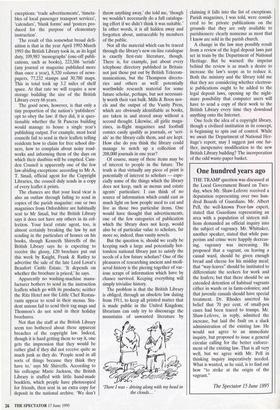One hundred years ago
THE TRAMP question was discussed at the Local Government Board on Tues- day, when Mr. Shaw-Lefevre received a deputation representing over two hun- dred Boards of Guardians. Mr. Albert Pell, the well-known Poor-law expert, stated that Guardians representing an area with a population of sixteen mil- lions demanded an official inquiry into the subject of vagrancy. Mr. Whittaker, another speaker, stated that while pau- perism and crime were happily decreas- ing, vagrancy was increasing. He proposed that a vagrant, on leaving a casual ward, should be given enough bread and cheese for his midday meal; that "way-leaves" should be instituted to differentiate the seekers for work and the loafers; but that there should be an extended detention of habitual vagrants either in wards or in farm-colonies; and that juvenile casuals should have special treatment. Dr. Rhodes asserted his belief that 70 per cent. of small-pox cases had been traced to tramps. Mr. Shaw-Lefevre, in reply, admitted the increase, but laid the fault on a slack administration of the existing law. He would not agree to an immediate inquiry, but proposed to issue a general circular calling for the better enforce- ment of the existing law. That is all very well, but we agree with Mr. Pell in thinking inquiry imperatively needed. What is wanted, as he said, is to find out how "to strike at the origin of the vagrant."
The Spectator 15 June 1895


































































 Previous page
Previous page